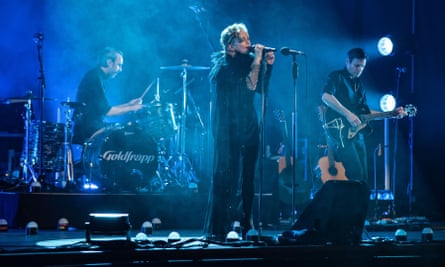It is fair to say Alison Goldfrapp has a complicated relationship with fame. In 2000, around the time of Felt Mountain, her and musical partner Will Gregory’s bewitching debut album as Goldfrapp, she returned home from a full day of interviews “crying and thinking: ‘What the fuck.’ No one had ever told us what an interview might entail,” she recalls now.
Later, as the duo’s success ramped up with 2005’s Grammy-nominated, million-selling opus Supernature – an album whose sultry, glam-adjacent electropop would influence Madonna and Kylie – journalists would often highlight the disparity between the playful, jumpsuit-sporting Alison Goldfrapp: The Popstar, and the quieter, more dressed-down offstage reality.
“I could tell male journalists were disappointed I hadn’t turned up in thigh-length boots, or wasn’t whipping their arses,” she smiles. “They wanted me to be this dominatrix. I did disappoint people and that upset me because I thought: ‘I’m not boring in real life.’”
While the group’s commercial clout waned slightly over their following four albums (their last, Silver Eye, came out in 2017), it often felt as if that retreat from the full glare of the spotlight suited its mercurial frontwoman. “Around Supernature I found it quite difficult,” she says, perched on the edge of a sofa in her management company’s north London offices, her oversized Gucci glasses catching the light. “I’m quite a shy person.”
That conflict between pop persona and human being, fantasy and reality, is destined to be triggered again by The Love Invention, her propulsive, synth-slathered solo debut album. Inspired by Italo-disco, electropop and new wave, it’s aimed squarely at the dancefloor. For Goldfrapp, however, clubbing is a rare occurrence: “I prefer an outside scenario, like a rave or a beach party … But at the same time I do like that intensity. A hot and sweaty club can be fun.”

So why do a solo album now? “Why now?” she repeats. There’s a pause, a regular occurrence during our time together – on two occasions she leaves the room to ask her manager for advice before deciding on an answer, and on another she gets up to grab her notebook so she can read over some notes she’s made. “Well, why not?” she eventually says, not unreasonably. “It felt like a natural time to do it. [In the past] I’d go off on tour and Will would have another project on the go. He’s always dabbled, and I thought: ‘Well, I’d like to try something else as well.’”
Started in her home studio in London, kitted out during the pandemic, The Love Invention’s early gestation was buoyed by Goldfrapp having complete creative control. “It gave me a certain confidence that I hadn’t really experienced before,” she says. “It was just me in a room.”
The spectre of it being a “solo album” hung heavy, however, so for a while it was just an EP. “I thought: ‘I can’t do an album, it’s too much pressure, it’s too big, this is just a little plaything.’ It seemed manageable.” Things quickly evolved when she took the songs to her new label, Skint Records, and they asked for more. Created with producers Richard X (Sugababes, MIA) and James Greenwood, AKA electronic artist Ghost Culture, Goldfrapp’s songs – which touch on intimacy (throbbing single So Hard So Hot), loss (In Electric Blue) and, on the title track, wellness culture – carry a greater sense of fun than some of her band’s more exacting, laboriously created output. “I’m used to gazing out of the window and 10 biscuits later just turning up a fader,” she laughs. “Both Will and I are like that.”
While Goldfrapp albums were often created in the countryside, and only occasionally reflected their bucolic setting (2008’s folksy Seventh Tree), The Love Invention was crafted in London. Not that Goldfrapp pays any mind to spurious links between its sweaty, sticky sound and the fact it was recorded in a bustling, late-night city. Nor will she be drawn into neat narratives around lockdown stasis encouraging a need to dance (“No. Sorry, yeah. No,” she laughs). She has, she says, written some of her most upbeat songs sitting next to a gently lapping river in the middle of a wood. “Here,” she points to her head, “is where I spend a lot of time dreaming. If you saw my little studio in my house you’d think: ‘God, it looks deeply uninspiring.’ It’s a portal. Everything’s a portal.”
That ability to escape into her own world arrived early. Born in Enfield, north London, the youngest of six children, Goldfrapp was raised in Alton in Hampshire, where she attended the local convent school. When I ask if it was there that she first realised she could sing, Sound of Music-style, she starts to answer before tailing off: “I’ve talked about this quite a lot so it might be boring.” After failing the entrance exam to continue into the school’s secondary tier, her life spiralled, and by 13 she’d fallen in with the wrong crowd. While she admits to being “pretty wild”, some of her experiences during that time – stealing cars, sniffing glue – have become exaggerated. “In the grand scheme of things it was just one summer that I did that,” she continues, rubbing a hand that features a scratchy DIY tattoo she gave herself during that period. “I certainly didn’t sniff glue regularly – I wouldn’t be around if that were the case.”
By 16, she had moved to London and was living in a squat, before briefly moving to Belgium. Four years later she went to art school and started dabbling in music, with her graduation piece involving her yodelling while milking an amplified cow. In 1994, she worked with dance duo Orbital before appearing on albums by Dreadzone and Tricky. “It was intense,” she says of her time with the latter. “I felt like I could do anything after that.” By 1999, she was making music with Gregory as Goldfrapp. “I was pretty old – I was thirtysomething when I signed to [Goldfrapp’s label] Mute,” she says. “I felt a bit like time was running out.”
after newsletter promotion
Goldfrapp’s propensity for crafting ever-shifting, intelligent dance music, typically presented with pop maximalism, quickly caught the attention of Madonna. The press dubbed Madonna Oldfrapp, while a fake quote circulated, attributed to Goldfrapp, dismissing Madonna as “always copying other people’s work”. “I have a lot of admiration for her actually,” Goldfrapp says now. “I met her once and was totally starstruck. She walked over to shake my hand and I remember the whole room spinning. She said something amazing recently along the lines of: ‘Just me still doing it is radical.’ She’s so right.”
Like Madonna, Goldfrapp often had to deal with people undermining her creative input, or putting age limits on pop star behaviour. “I remember a journalist saying to me: ‘You’ve just turned 40, do you think you’re too old to be wearing those miniskirts?’ Things like that.” There was also a focus on her sexuality, with one interviewer in 2010 asking outright if she was a lesbian. “I’m always a bit ambiguous about it,” she says quietly. “I just don’t feel like I’m this or that. I think people change all the time throughout our lives. I don’t feel like I’m one or the other.”
It would have been easy for Alison Goldfrapp’s return to music to be tentative after the harsh glare of the 00s – a dip of the toe in choppy waters and then a hasty retreat. Instead, The Love Invention is a big, bold pop album, for the head and the heart, made by someone who enjoys the escapist fantasy of creating a character. She can’t quite escape reality, however. While she hopes to tour the album she is aware that the combination of Brexit and Covid means it costs “a shitload of money. It’s hard out there.” For now, she’s happy at home, in her portal, indulging her latest hobby.
“I like collecting rocks,” she smiles. “I’m obsessed with them. I don’t pick up any old rock; it has to have some kind of interest.” The dormant pop star re-emerges: “I am drawn to anything that twinkles.”
The Love Invention is out on 12 May.

Comments (…)
Sign in or create your Guardian account to join the discussion